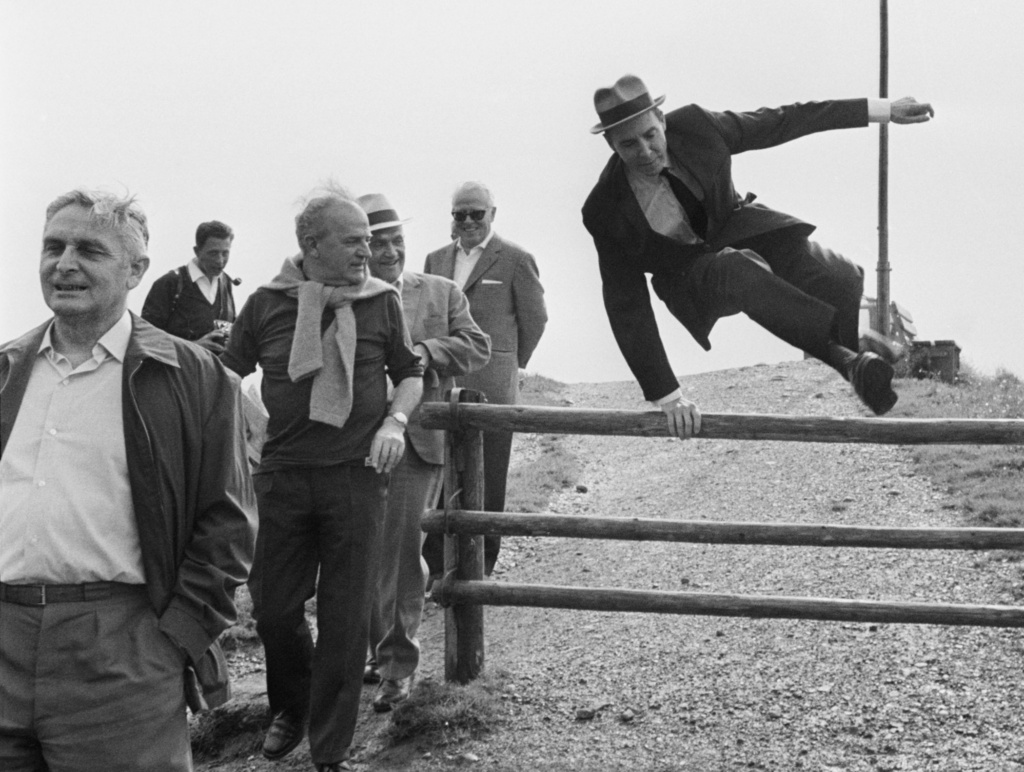President makes the government’s voice audible

The position of Swiss president changes yearly, rotating through the cabinet ranks. Attempts to extend the term limit to benefit foreign relations have failed amid fears that not everyone will get their chance at the top of the tree.
On December 5, members of the House of Representatives and the Senate will gather to elect the president for next year. Based on cabinet seniority, it will be Defence Minister Ueli Maurer’s turn at the helm.
The president leads government meetings and represents the country
abroad on state visits. While still pursuing his ministerial activities, he is considered first among equals for a year and does not defer to the other ministers during that time.
After 12 months in the often largely ceremonial post as the country’s leader, the president then hands over the reins to the next in line, who will be Foreign Minister Didier Burkhalter in 2014.
“It’s a little difficult for foreign governments to adjust to a different face every year,” admits Walter Fust, former head of the Swiss Agency for Development and Cooperation.
“Switzerland is known for its stability, but the appearance of a new leader every 12 months is an exception. Most countries don’t realise the president is a first among equals or that he or she continues to oversee a ministry.”
But there have been discussions for over a decade about whether the term should be lengthened, notably because of the swelling number of sensitive issues Switzerland has faced in recent years such as tax disputes with the United States, the European Union and Germany, as well as institutional problems with the EU.
In 2010, the government proposed increasing cabinet membership from seven to nine and extending the presidential term to two years. Both proposals were rejected by parliament, torpedoing any chance of providing more continuity to the country’s foreign relations.
“The reason is that the parties and minority groups fear they would no longer have the same chance of reaching the presidency as they do now,” said Kurt Fluri, a member of the House political institutions committee.
Speaking from experience
Extending the mandate a further year is not a good idea according to former interior minister Ruth Dreifuss, the country’s first woman to take on the role of president in 1999.
“It was a wonderful experience, but it was also a heavy workload since I was managing my ministry at the same time,” she said. “It was an enriching experience, but I doesn’t do anything particular for you.”
During Dreifuss’s term as president, her main job was still to be interior minister since foreign relations are mostly affairs of protocol. “Foreign policy is really handled by the ministries themselves who try to ensure smooth relations,” she added.
She says that her ministry benefited from her presidency because of the many international contacts her services were able to make on environmental, health and educational issues. According to Dreifuss, the presidency is also an opportunity to make the government’s voice heard at home as well as abroad.
Collective foreign policy
Under the Swiss constitution, responsibility for foreign policy is not restricted to one specific ministry. Instead, the entire government has a say in how foreign relations play out.
So, when the president travels abroad, he or she often feels like one-seventh of a foreign minister, according to Fust.
“The president can already do a lot simply by ensuring smooth government
meetings, but also by the way he represents the cabinet at home or in front of foreign representatives,” he added. “There is a certain amount of leeway in his or her actions.”
While in front of the Swiss parliament, the president is nothing more than a minister. But abroad, say Fust, he contributes to Switzerland’s image, especially through international media.
“A lot depends on how the president is perceived, what his or her attitude is,” he said. “This can influence the way Switzerland is considered abroad.”
Parliamentary acceptance
The presidential election is also a test of a minister’s popularity and political acceptance. Two years ago, the centre-left Social Democrat Micheline Calmy-Rey was sanctioned with a relatively low score.
Maurer, a member of the rightwing Swiss People’s Party, will probably not get much sympathy from parliament either.
Faithful to his party’s hardline policies, he is against closer ties to the European Union. His political opponents also say he is hostile to working women and immigration and is not afraid to put across his opinions, something the centre-Left and Left will most likely make him pay for.
“When someone is elected to the cabinet, they know their turn to be president will come,” said historian Urs Altermatt. “If some wrestlers, gymnasts or a canton have an anniversary to celebrate, for example, I’m sure Ueli Maurer will gladly attend.”
“Nobody has ever held back from taking on this position,” added Fust. “Once Maurer is elected, he will have to show he can stay above the fray and away from partisan politics.”
“He will have to behave diplomatically and will not be able to consider Switzerland as an island. Because you are allowed to think big, even if as a Swiss minister you often have to manage the small stuff.”
2012 – Eveline Widmer-Schlumpf
2011 – Micheline Calmy-Rey
2010 – Doris Leuthard
2009 – Hans-Rudolf Merz
2008 – Pascal Couchepin
2007 – Micheline Calmy-Rey
2006 – Moritz Leuenberger
2005 – Samuel Schmid
2004 – Joseph Deiss
2003 – Pascal Couchepin
2002 – Kaspar Villiger
2001 – Moritz Leuenberger
2000 – Adolf Ogi
1999 – Ruth Dreifuss
The Swiss government consists of a cabinet made up of seven members.
Cabinet members are nominated by their parties and are elected at a joint session of parliament.
For 50 years, cabinet posts were shared among the four main parties, the Radicals, the Christian Democrats, the Social Democrats and the Swiss People’s Party according to a system known as the Magic Formula.
The Magic Formula was slightly changed in 2003 and a fifth party won a seat in 2007.
A fundamental tenet of the multi-party cabinet is the need to reach consensus.
Elected for a one-year term from among the seven members of the cabinet, the president is a “primus inter pares” (first among equals). The president chairs government meetings and takes on some representative functions, but there are no additional powers to the office.
The Federal Assembly (members of the House and Senate) gather during the winter parliamentary session to elect the president and vice-president for the following year. This year, the election is being held on December 5.
Eveline Widmer-Schlumpf was president this year, with Ueli Maurer as her vice-president. Maurer will normally be elected president for 2013, with Didier Burkhalter becoming vice-president.
(Adapted from German by Scott Capper)

In compliance with the JTI standards
More: SWI swissinfo.ch certified by the Journalism Trust Initiative



You can find an overview of ongoing debates with our journalists here. Please join us!
If you want to start a conversation about a topic raised in this article or want to report factual errors, email us at english@swissinfo.ch.